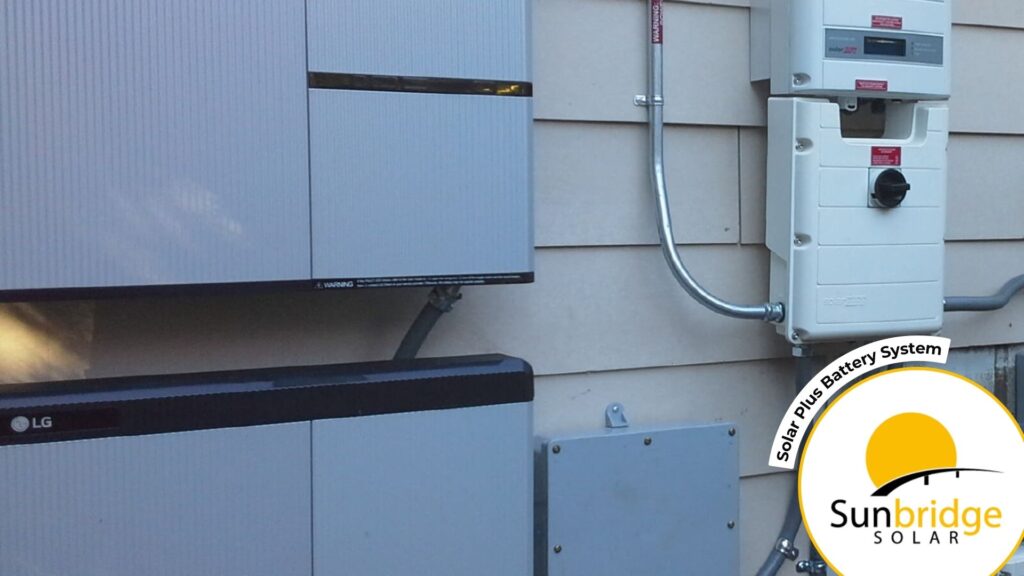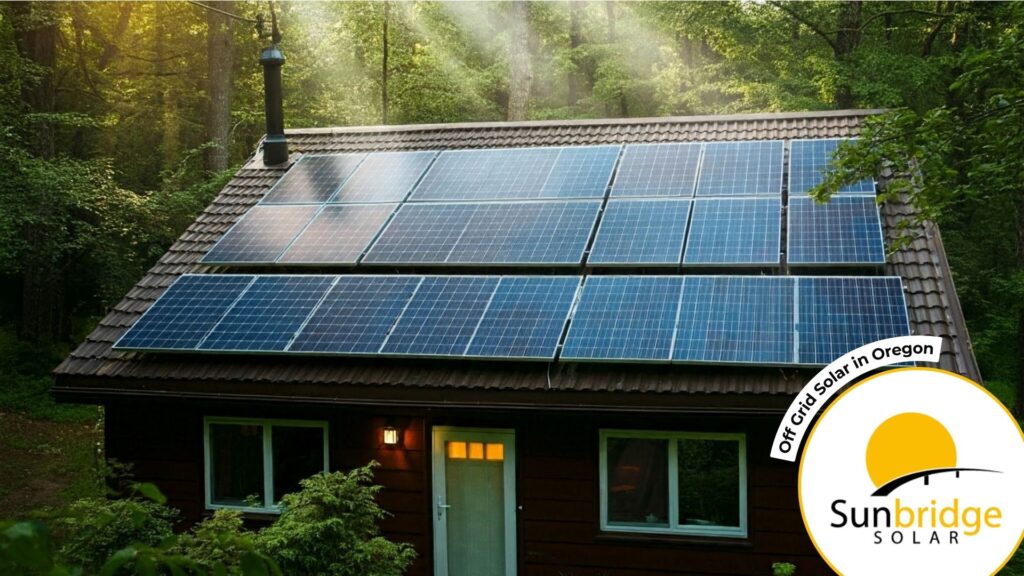Off Grid Solar: Is It Feasible?
“Going off the grid” is a phrase that evokes images of independence, self-sufficiency, and freedom from reliance on traditional utilities. For many Oregonians, the dream of harnessing the sun’s energy to power their homes completely is becoming increasingly attractive.
But is it feasible? What are the costs and benefits? And what challenges should you be aware of? In this comprehensive guide, we’ll explore everything you need to know about off-grid solar in Oregon.’
What are Off-Grid Solar Systems?
An off-grid solar system is designed to operate independently of the utility grid. It generates, stores, and manages its own electricity, providing power even in remote locations or during power outages.
Key components include:
- Solar panels: Convert sunlight into direct current (DC) electricity.
- Batteries: Store excess electricity generated by the solar panels for use when the sun isn’t shining.
- Charge controller: Regulates the flow of electricity between the solar panels and batteries.
- Inverter: Converts DC electricity from the solar panels and batteries into alternating current (AC) electricity, which is used to power household appliances.
- Backup generator (optional): Provides additional power during extended periods of low sunlight or high energy demand.
Advantages of Going Off-Grid in Oregon
For Oregonians seeking a more self-sufficient and sustainable lifestyle, off-grid solar power opens up a world of possibilities. Here are some of the most significant advantages to consider:
Energy Independence
Free yourself from the constraints of the utility grid and fluctuating electricity prices. This also means protection from the increasing frequency of grid power outages, particularly those caused by forest fires and earthquakes which have become more common in recent years. With an off-grid system, you have a reliable source of power, regardless of external events.
Environmental Sustainability
Reduce your carbon footprint and contribute to a cleaner future by using clean, renewable energy. Solar power represents a significant step towards mitigating climate change and protecting Oregon’s natural resources.
Lower Electricity Bills
Eliminate or significantly reduce your monthly electricity costs. The sun provides a free and abundant source of energy, and once your system is paid off, you’ll be generating your electricity at virtually no cost.
Resilience
Maintain power during grid outages and natural disasters. This extends beyond typical weather events to include events like forest fires and earthquakes that can cause prolonged power outages. An off-grid solar electric system with battery backup ensures you have power when you need it most.
Remote Living
Enable living in remote or off-the-beaten-path locations. Off-grid solar opens up possibilities for sustainable living in areas where traditional grid connections are unavailable or impractical.
Challenges of Off-Grid Solar in Oregon
While the allure of off-grid living is strong, it’s essential to be aware of the challenges that come with it, especially in Oregon’s unique climate and landscape.
- High Upfront Costs: The initial investment for an off-grid solar system can be substantial, including the cost of solar panels, batteries, inverters, and installation. However, consider this an investment in your energy future and weigh it against the long-term savings and benefits.
- Weather Dependence: Oregon’s climate, with its cloudy winters and rainy seasons, can impact solar energy production. This is where proper system sizing and battery storage become critical to ensure a consistent power supply throughout the year.
- System Sizing and Maintenance: Proper system sizing is crucial to ensure adequate power supply. Regular maintenance is required to ensure optimal performance and longevity. A reliable solar installer can help you design and maintain a system that meets your needs.
- Land Requirements: Sufficient space is needed for solar panel installation, especially for larger systems. If you have limited space, consider options like ground-mounted arrays or exploring community solar projects.
- Regulatory Considerations: Check local zoning regulations and permit requirements before installing solar panels for an off-grid solar system. Ensure your system complies with all relevant codes and guidelines.
Costs of Off-Grid Solar Systems in Oregon
The cost of an off-grid solar system varies depending on several factors, including:
- System size: The number of solar panels and solar batteries required to meet your energy needs.
- Equipment quality: The quality and brand of the components used in the system.
- Installation complexity: The location and difficulty of the installation.
- Additional features: Backup generators, energy monitoring systems, and other add-ons.
On average, you can expect to pay anywhere from $20,000 to $50,000 or more for a complete off-grid solar system in Oregon. However, it’s essential to get a personalized quote from a reputable solar installer like Sunbridge Solar to accurately assess your specific needs and budget.
Financial Incentives for Off-Grid Solar in Oregon
While Oregon doesn’t currently offer specific incentives exclusively for off-grid solar systems, there are several programs that can help reduce the upfront solar panel costs associated with your investment:
Federal Solar Tax Credit
Take advantage of a 30% federal tax credit on the total cost of your solar energy system. This includes not only your solar panel system but also the batteries, inverter, and other eligible components, making a significant dent in your overall investment.
Energy Trust of Oregon
The Energy Trust of Oregon offers cash incentives for energy-efficient upgrades, including solar panels and battery storage systems. These incentives can further reduce the cost of your off-grid system, making it a more financially attractive option.
Oregon Solar Storage Rebate Program
This program offers rebates for both solar panel installations and paired battery storage systems, which can significantly reduce the upfront cost of your off-grid system.
Solar Within Reach
If you meet specific income requirements, the Solar Within Reach program offered through the Energy Trust of Oregon can provide up to 60% off the cost of a solar energy system, including off-grid solutions. This program aims to make solar power more accessible and affordable for income-qualified households.
Consulting with a tax professional or financial advisor is crucial to fully understand the specific eligibility requirements and maximize the benefits of these incentives.
At Sunbridge Solar, we’re well-versed in navigating the complexities of solar incentives in Oregon and can guide you through the process, ensuring you get the most out of your investment. We’ll work closely with you to identify all applicable incentives and help you make informed decisions about your off-grid solar project.
Factors Affecting Off-Grid Solar System Size
Determining the appropriate size of your off-grid solar system requires careful consideration of several factors:
- Energy Consumption: Analyze your current and future energy needs to estimate the daily and annual kilowatt-hour (kWh) usage.
- Sun Exposure: Evaluate the amount of sunlight your property receives throughout the year.
- Battery Capacity: Calculate the battery storage needed to cover periods of low sunlight or high energy demand.
- System Efficiency: Consider the efficiency of your solar panels, inverter, and other components.
- Future Expansion: Plan for potential future energy needs, such as adding appliances or expanding your home.

Off-Grid Solar System Maintenance
Proper maintenance is essential to ensure the optimal performance and longevity of your off-grid solar system. Regular tasks include:
- Cleaning solar panels: Remove dirt, dust, and debris that can reduce energy production.
- Inspecting batteries: Check for corrosion, leaks, or damage.
- Monitoring system performance: Use energy monitoring tools to track energy production and consumption, identify potential issues, and optimize system efficiency.
- Replacing components: Batteries and inverters have a finite lifespan and may need replacement after several years.
Making the Switch to Off-Grid Solar
If you’re considering going off-grid with solar power in Oregon, it’s important to do your research, assess your energy needs, and consult with a reputable Oregon solar installer. Sunbridge Solar, Oregon & Washington’s expert in solar panel installations, can help you navigate the complexities of off-grid solar and design a system that meets your unique requirements.
Remember, the path to off-grid living with solar power is an investment in your future and the planet. With careful planning and the right guidance, you can achieve energy freedom and contribute to a cleaner, greener Oregon.
Call Sunbridge Solar at 360-313-7190 or fill out our online form to schedule your free consultation and get started on your off-grid solar journey today!
Why Choose Sunbridge Solar?
- Affordable Prices: We’re fast, efficient, and accurate, keeping our costs low and passing the savings on to you.
- Confirmed Quality: Independently verified by the Energy Trust of Oregon and through numerous positive customer testimonials.
- Fast Turnaround: Enjoy a quick and seamless installation process, typically completed in 2-3 days.
- 25-Year Warranties: We stand behind our work with the best warranties in the industry, giving you peace of mind.
Don’t miss out on the benefits of off-grid solar living. Contact Sunbridge Solar today and start powering your future with the sun!
Off-Grid Solar in Oregon FAQs
What happens to excess electricity from solar panels off-grid?
Excess electricity generated by your solar panels is stored in batteries for later use. Once the batteries are fully charged, the charge controller may divert the excess energy to a dump load, such as a water heater or other non-essential appliance.
How many solar panels to run a house off-grid?
The number of solar panels required depends on your energy consumption, sun exposure, and other factors. On average, a typical off-grid home in Oregon may need anywhere from 10 to 20 or more solar panels.
Can an off-grid solar system work without batteries?
While technically feasible, operating an off-grid solar system without batteries is not practical or recommended. Batteries provide essential energy storage for use during periods of low sunlight or high demand.
Can Off-Grid Solar Systems Work Without Batteries?
While technically possible, operating an off-grid solar system without batteries is not recommended. Batteries provide crucial energy storage, allowing you to use electricity when the sun isn’t shining or during periods of high demand. Without batteries, you’ll be limited to using electricity only when the sun is directly hitting the solar panels.
Can You Live Off the Grid with Solar Power in Oregon?
Yes, it’s definitely possible to live off the grid with solar power in Oregon. However, it requires careful planning, investment, and commitment to energy conservation. With a properly sized and maintained off-grid solar system, you can enjoy energy independence, reduce your environmental impact, and potentially save money on electricity costs in the long run.


